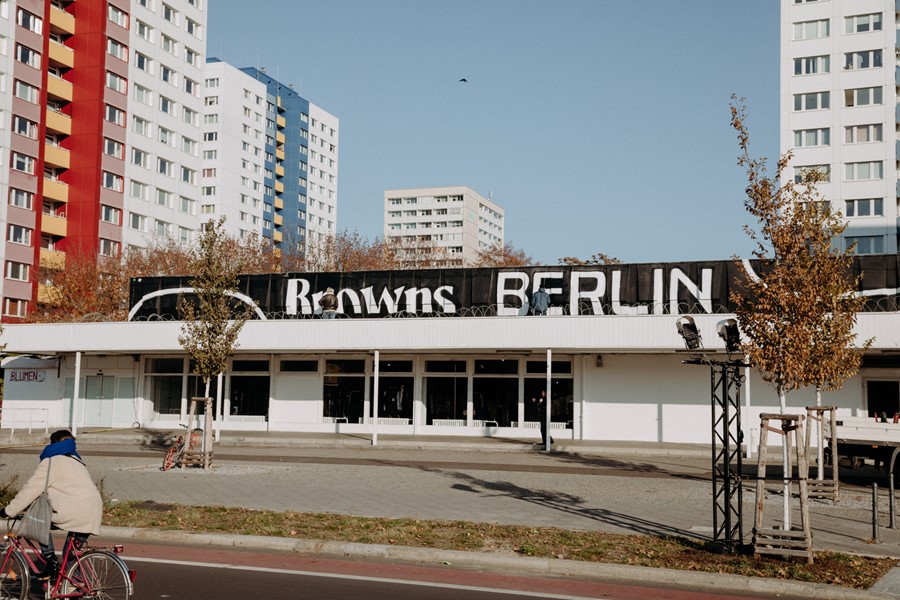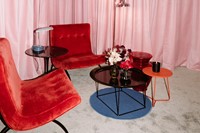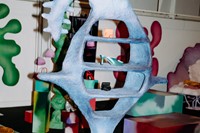This weekend in Berlin, Browns Fashion hosted designers, artists, and musicians at a series of events in a space that was once a supermarket
The residents of Berlin have long been adept at giving old spaces new life: a concrete bunker might become an art gallery; a power plant a nightclub; derelict neighbourhoods rebuilt from the ground up. And, this past week in the city’s central Mitte district – once split in half by the Berlin Wall – London-based boutique Browns Fashion turned an abandoned supermarket into a store of an altogether different kind: the latest iteration of its ongoing ‘Nomad’ project, a series of travelling retail spaces which last year saw the retailer set up shop within cult Los Angeles store Fred Segal.
Inside the vast space – in which several elements of the original supermarket remain, including vault-like back rooms, once the store’s fridges and freezers – was an edit of products from the boutique, selected with local customers in mind (the German market is the retailer’s fifth largest). On rails repurposed from the previous Nomad store in Los Angeles hung a slew of labels, from the known-by-everybody – Gucci, Prada, Givenchy and the like – to the known-by-few; including Mariah Esa who constructs garments out of deadstock clothing labels and only graduated from Leicester’s De Montfort University this past July (she was discovered by Browns’ buying director Ida Petersson at a British Fashion Council showroom, and continues to live in work in Leicester).
Other emerging designers included Duran Lantink, the Amsterdam-based designer whose hybrid garments – themselves made from repurposed luxury clothing – saw him nominated for the prestigious LVMH prize earlier this year. Among turned-over shopping trolleys and shelves stacked with jars of Nutella and dill pickles (the designer’s reckoning of a post-apocalyptic supermarket), he showed a collection of eclectic garments spliced together from old clothing given to him by Browns’ chief executive officer Holli Rogers, alongside those from family and friends (one piece included a section of wedding dress from a friend who had split up with her then-husband the next day – “she said: use it, dye it, abuse it,” according to Lantink). As part of Nomad, Lantink was available to upcycle old garments customers brought into the pop-up; after a consultation, the finished garments would be sent to them in two weeks. “I love talking to people about their clothes,” he says.
Taking a risk on new talent has been at the heart of Browns since its conception: Joan Burstein, the founder of Browns affectionately known as ‘Mrs B’, was the first to stock Alexander McQueen, John Galliano and Hussein Chalayan, creating a space where emerging and established designers – along with their respective customers – mingled freely. As current chief executive, Rogers works in the same spirit, placing newness at the very forefront of what she’s done since taking the position in 2015 – not simply in the store’s offering, but also in the shopping experience itself. Such was the case for the first ‘Nomad’ store which launched in 2017 in London’s Shoreditch, Browns East, a constantly rotating shopping and events space, and part of Farfetch’s “Store of the Future” concept (Farfetch acquired Browns in 2014; Rogers serves as chief brand officer alongside her role at Browns).
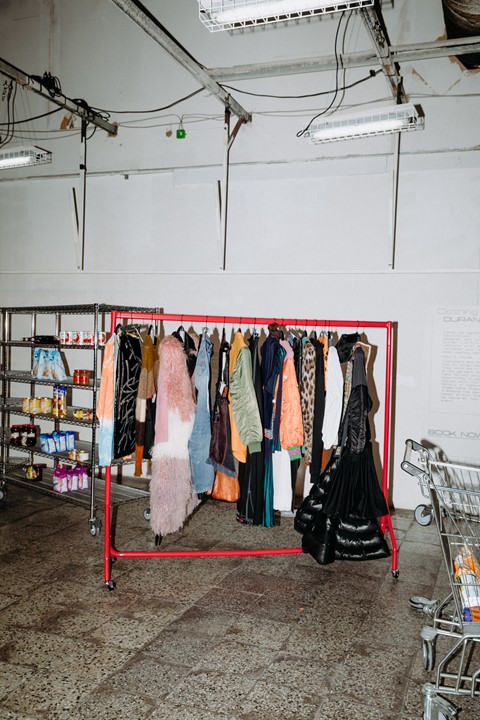
“My previous experience was solely online, so I didn’t have a lot of emotional connection in terms of the physicality of a space,” Rogers said at a talk in the Berlin store on Saturday evening. “When I started at Browns I was like, so, what is this retail store that I have to deal with? And how do you do something interesting with it? For me, online shopping has become quite functional... you can’t smell anything, you can’t touch anything. When we opened the store in Shoreditch we wanted people to stick around and have a coffee; we wanted people to be immersed in something they had never experienced before.”
Berlin proved to be an entirely new proposition: after all, the city is known for an underground culture which is – often purposely – inpenetrable to outsiders. So, for the three-day pop-up, Browns collaborated with Berlin-based creative agency Reference Studios – founding CEO Mumi Haiati is perhaps the city’s most well-connected man – on a series of events which included everything from palm reading to panel talks and an opening party, for which much of Berlin’s fashion scene gathered for performances by DJ collective No Shade, artist and DJ Juliana Huxtable and British musician IAMDDB. (Reference Studios has a reputation for bringing people together: earlier this year, they held the first Reference Berlin, a 24-hour fashion and art festival in an abandoned car park which drew international names like Martine Rose, Michel Gaubert and Isamaya Ffrench.)
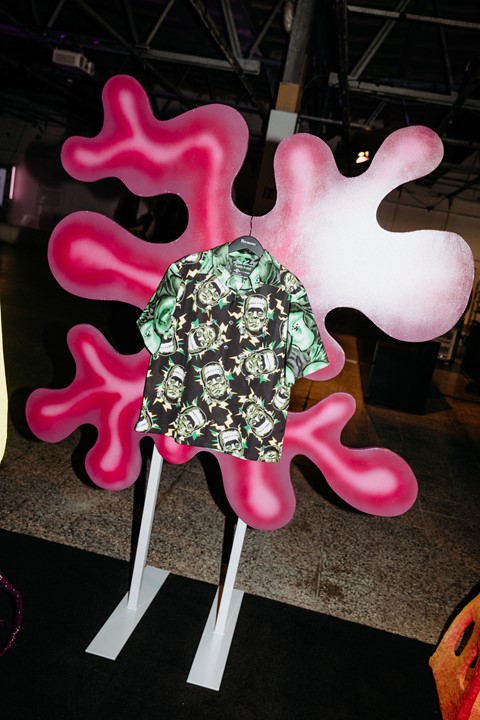
It was this energy that Browns was keen to harness. “Berlin felt really connected with what we were doing,” says Petersson of the decision to host the Nomad in Berlin rather than say, Munich, where much of Germany’s fashion industry continues to be based. “The art scene here is incredible, the galleries they have, the architecture, the furniture stores.” “It still feels raw,” adds Dean Cook, Browns’ head of menswear buying.
The weekend culminated with a performance staged within an installation erected by industrial artists OrtaMiklos by dancer Vinson Fraley Jr. Amid their surreal, organic forms, many of which were constructed from compacted recycled carboard, Fraley enacted the peculiar, seductive pleasures of trying on clothing, donning pieces by Comme des Garçons, JW Anderson and Vaquera as he traversed the space – watched on by various locals, including designers Stefano Pilati (who now operates his recently founded label Random Identities from Berlin) and Benjamin Huseby and Serhat Isik, founders of Berlin-based brand GmbH; both GmbH and Random Identities are founded on the city’s progressive values.
“For a while I thought I would move here,” says Fraley, who lives in New York but spends much of his year in the German capital. “There’s still something about Berlin which feels a bit like a mystery: all these people just trying to claw themselves in, to make something. Even this [Browns] space here, you can reimagine what it can be. You have space to make things,” he says. “There is freedom here.”
Browns Nomad Berlin ran from November 14 – 16 2019. To find out more about the programme, and the designers involved, visit the Browns website.
